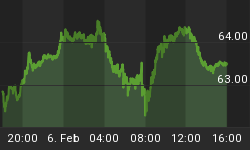Economics is not an exact science. It pales in comparison to mathematics because it contains a high component of art in its analysis. With that said, there are several principles that still apply. One such principle is: when the condition of an economy becomes overleveraged, it needs to experience consistently expanding GDP with unabated asset price appreciation and a falling currency, or it will become insolvent. A fall in economic activity leads to lower asset prices, which force the dumping of those assets held on leverage. Also, an increase in the value of money will increase the value of all debt making it much more difficult to repay. The resulting dumping of assets leads to a deflationary spiral and economic turmoil.
The only debate should be about what constitutes insurmountable debt and what qualifies as an overleveraged condition. Taking on a small amount of debt that is used to acquire capital goods is always acceptable. However, a problem occurs when debt levels rise to the point where it becomes greater than a country's growth or taxing capacity. But the fact is that the debt of the United States both measured nominally and as a percentage of GDP has never been greater. Total non-financial debt at the conclusion of Q1 2009 was $33.9 trillion, while total debt as a percentage of GDP was 361%!
For me, the consequences of our record breaking and historic levels of debt are clear. Our country is faced with the decision to debase the currency by massively inflating the money supply or allow the depressingly painful deleveraging cycle to run its course.
First we tried the inflationary path. The monetary base raised from $900 billion to $1.8 trillion during the October 2008 thru May 2009 time frame. It is no coincidence towards that at the end of that record shattering move, the dollar index began to break down, there was a surge in bond yields, and commodity and stock prices moved sharply higher. There also began to be improvement in the second derivative fall of home prices. For me, this is empirical evidence of our inflation addiction. Our government deemed it necessary to crush the dollar in order to engender a brief period of ersatz prosperity.
However, when oil traded at over $70 a barrel the Federal Reserve was forced into jawboning an exit strategy for the inflation they were creating. The Fed has since let the monetary base stagnate for the last six months at a lofty $1.6- $1.8 trillion range. The result of their comparatively prudent monetary policy has caused the dollar to stabilize, bonds to rally, commodities to fall and stocks to rollover. This is all great news for the economy in the long term but will spread Agent Orange on the "green shoots of recovery" in the short term.
What the Fed fails to comprehend is that bank assets and consumer balance sheets will continue to erode if real estate prices continue to fall and the rate of unemployment continues to increase. Therefore, you cannot have it both ways. They either have to accept the idea that the rate of inflation will be significantly higher than their 2% target rate for a period of years or they will have to allow asset prices to fall far below their historic levels. This is precisely because as the consumer pays down their record debt, asset prices will overshoot to the downside.
Ordinarily, the appropriate prescription for debt repayment is growth. But the growth in the economy is limited by the increase in the work force plus productivity growth. Total debt has increased by an average of 8.4% in the past five years and is still increasing at a 4.1% annual rate! You simply cannot grow or tax your way out of a situation where debt is multiples higher than nominal GDP and the rate of GDP growth.
A significant increase of inflation rates would bail out real estate values in the short term but may destroy the economy down the road -- especially if government spending is not reigned in. Whereas a stable dollar caused by a shrinking monetary base would put the greater recession/depression scenario back in the picture, but is the only path to long term economic viability.
Unfortunately judging from history, the administration will bow to political pressure and rush through another "stimulus" package that will drive us further into the debt abyss. I also expect Federal reserve Chairman Banana Ben will recidivate and step up his monetization efforts. It is difficult to judge when the inflation path will re-emerge but my guess is when the unemployment rate reaches double digits this autumn. Perhaps the reflation trade will be put on hold until then.
*Tired of paying fees while your account value plummets? Learn about our new performance-based pricing.
Be sure to listen in on my Mid-Week Reality Check
Follow me on Twitter: http://twitter.com/michaelpento















